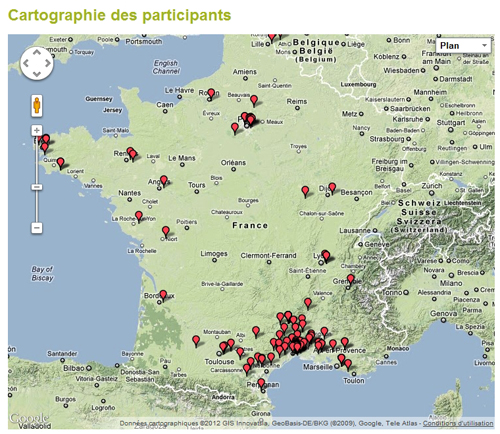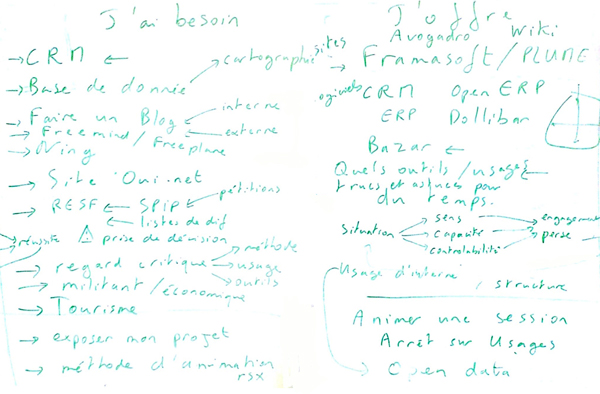1. Before a meeting...
It is always wise to start this "training" in PD with a simple action, in a way that isn't too “engaging” -disturbing. Just a quick try, to see how it works… A good way of getting a feeling of the virtues and demands of PD, and of not going too far and then having to go back to practices without much democracy. We will work on generating “small irreversible experiences”Ex.1 Many small steps yield big results
Let's imagine a situation with a one-day seminar on “preserving biodiversity in agricultural practices”, for which each potential participant can refer to a website presenting the global aims of the meeting, its dates and venue, etc. to the organisers.This introduction to PD could start by asking each person that has registered for the event a few additional questions to their information. For example:
- the three key words you associate with the word agriculture (free or from a list)
- the same for the word biodiversity
- two bibliographical references that you would recommend on these two topics
- etc...
If there is no website for the seminar, this PD process could be started by a round at the start of the seminar asking these same questions. This would be an introduction that would be more original than saying “I am Mr. XX and I do this or that in life…”. Right from the start, this round of presentations, allows diving into the topic with everyone participating.
It also allows, through these collective references that are in the process of being made, or through this bibliography, creating a common good that is useful to all and free.
Ex.2 You have been tagged
- In order to better engage participants in a meeting it is especially interesting that each of them can be geo-referenced and discover common grounds, friends or shared acquaintances, etc. Especially in a seminar with dozens of people who do not know each other very well.

Doing this is easy: the same procedure will be used for the Internet option and for the brief personal questionnaire, asking each participant to indicate on a French administrative map or a different one (templates are available on-line) their place of residence and/or work, depending on the nature of the meeting.
When there isn't a seminar website, we can get an IGN or Michelin map and post it by the entrance of the seminar room together with coloured push-pins so that everyone can give their location, and also with paper strips where everyone can write their name (and an telephone number or email address). In cases where a photograph is required for registration, this could even be used in a small version placing it next to the location...
- Depending on the meeting, it would also be possible to do the same using a map of the structures and organizations at the seminar; this would allow everyone to know who is there and who isn't, the structures of the organization's boards that are there, etc… We could also add a blank sheet next to the map to explain the acronyms of each organization to the others…
- And finally, it would also be possible to add a geo-theme to the geo-reference. For example, for the topics of the seminar mentioned above, there could be a chart with questions and key words for reflection that would be suggested for a collective discussion. By clicking on one or other of these, participants could indicate which of them are of a special interest. It is also good to leave one or more empty boxes so that anyone can add other themes and questions that were left out by the organisers. This mapping can be done either on the Internet, before the seminar takes place, or by the entrance to the seminar room on a physical board on the wall.
It is even possible to take this exercise one step further by allowing participants to add a brief note or information to complement their position, on the internet or on the physical board.
- The same idea can be used with a "search notice": a chart on the Internet that could then be printed and posted by the entrance to the seminar room, where everyone could write “I am looking for information on the performance of RCW techniques (Ramial Chipped Wood) to preserve the biodiversity of earth organisms” or “I wonder if agri-environmental measures discussed in the framework of the CAP (Common Agricultural Policy) integrate the establishment of apiculture set-aside areas?” etc. Each participant would add a telephone number or email address to their question so that, before or after the seminar, others can (continue to) answer the question.

A small and intelligent internet sheet (that can easily be printed and posted on a wall) would allow people to post replies below the question or request so that everyone could see them (together with contact information). This is part of the collective reflection process and also allows anyone who has posted a question on the “search notice” to go back home after the seminar with the contact information for the people with whom he or she may continue discussing the matter.
It would be appropriate to ask each author of a “search notice” to give the group a summarised feedback on the answers received, at the end of the seminar or via Internet some days later.
Ex. 3 On the use of cooperative tools
Within the framework of an internet network that organises meetings or information exchanges, we could add a series of very simple yet extremely useful tools, such as a shared calendar so that everyone can visualise the group activities and meetings and also make suggestions for activities in an available slot, thus avoiding overlapping emails and leaving people out of participating.Whatever the content of these maps and charts, the organisers of a seminar should make sure they mark on the physical map or chart that is posted by the entrance to the seminar room all the location points, mappings, search notices, etc. sent by participants via the Internet.
These on-line tools (surveys, calendars, etc.) can be managed by modules and access to their parameters allows giving them a format and modifying them. A preliminary discussion on these points is therefore required in a group.
It's clear, then: To start, some time and space is required for this dialogue between participants to take place, and planning for this dialogue to continue after the meeting.